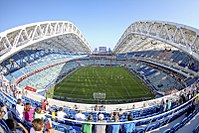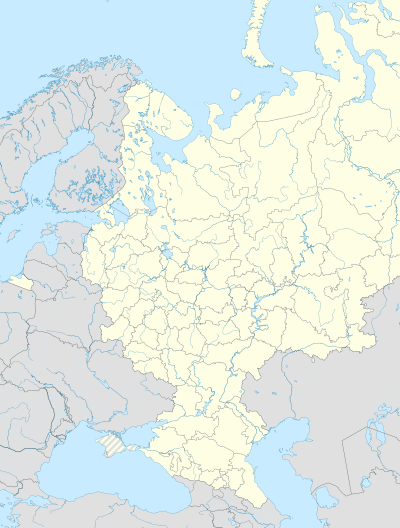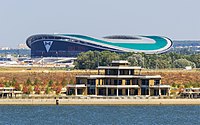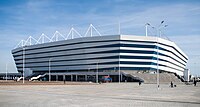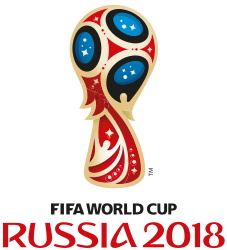 The 2018 FIFA World Cup will be the 21st FIFA World Cup, a quadrennial international football tournament contested by the men’s national teams of the member associations of FIFA. It is scheduled to take place in Russia from 14 June to 15 July 2018, after the country was awarded the hosting rights on 2 December 2010.
The 2018 FIFA World Cup will be the 21st FIFA World Cup, a quadrennial international football tournament contested by the men’s national teams of the member associations of FIFA. It is scheduled to take place in Russia from 14 June to 15 July 2018, after the country was awarded the hosting rights on 2 December 2010.
This will be the first World Cup held in Europe since the 2006 tournament in Germany, and the first ever to be held in Eastern Europe. All of the stadium venues are in European Russia, to keep travel time manageable.
The final tournament will involve 32 national teams, which include 31 teams determined through qualifying competitions and the automatically qualified host team. Of the 32 teams, 20 will be making back-to-back appearances following the last tournament in 2014, including defending champions Germany, while Iceland and Panama will both be making their first appearances at a FIFA World Cup. A total of 64 matches will be played in 12 venues located in 11 cities. The final will take place on 15 July at the Luzhniki Stadium in Moscow.
The winners of the World Cup will qualify for the 2021 FIFA Confederations Cup.
https://www.youtube.com/watch?v=LJ2vr7VUytM
Host selection
The bidding procedure to host the 2018 and 2022 FIFA World Cups began in January 2009, and national associations had until 2 February 2009 to register their interest. Initially, nine countries placed bids for the 2018 FIFA World Cup, but Mexico later withdrew from proceedings, and Indonesia’s bid was rejected by FIFA in February 2010 after the Indonesian government failed to submit a letter to support the bid. During the bidding process, the three remaining non-UEFA nations (Australia, Japan, and the United States) gradually withdrew from the 2018 bids, and the UEFA nations were thus ruled out of the 2022 bid. As such, there were eventually four bids for the 2018 FIFA World Cup, two of which were joint bids: England, Russia, Netherlands/Belgium, and Portugal/Spain.
The twenty-two-member FIFA Executive Committee convened in Zürich on 2 December 2010 to vote to select the hosts of both tournaments. Russia won the right to be the 2018 host in the second round of voting. The Portugal/Spain bid came second, and that from Belgium/Netherlands third. England’s bid to host its second tournament fell at the first hurdle.
The voting results were as follows:
| Bidders | Votes | |
|---|---|---|
| Round 1 | Round 2 | |
| Russia | 9 | 13 |
| Portugal / Spain | 7 | 7 |
| Belgium / Netherlands | 4 | 2 |
| England | 2 | Eliminated |
The process was not without criticism: allegations of bribery on the part of the Russian team and corruption from FIFA members were made particularly by the English Football Association. It was alleged that four members of the executive committee had requested bribes to vote for England, and Sepp Blatter said that it had already been arranged before the vote that Russia would win. Although the 2014 Garcia Report absolved Russia of any blame, the FA refused to accept this, with Greg Dyke calling for a re-examination of the affair and David Bernstein calling for a boycott of the World Cup.
2018 FIFA World Cup Teams
For the first time in the history of the FIFA World Cup, all eligible nations – the 209 FIFA member associations minus automatically qualified hosts Russia – entered the qualifying process. Zimbabwe and Indonesia were later disqualified before playing their first matches, while Gibraltar and Kosovo, who joined FIFA on 13 May 2016 after the qualifying draw but before European qualifying had begun, also entered the competition. Places in the tournament were allocated to continental confederations, with the allocation unchanged from the 2014 World Cup. The first qualification game began in Dili, Timor Leste, on 12 March 2015 as part of the AFC’s qualification, and the main qualifying draw took place at the Konstantinovsky Palace in Strelna, Saint Petersburg on 25 July 2015 at 18:00 local time (UTC+3).
Of the thirty-two nations qualified to play at the 2018 FIFA World Cup, twenty countries competed at the previous edition of the tournament in 2014. Both Iceland and Panama qualified for the first time, with the former becoming the smallest country in terms of population to reach the World Cup. Other teams returning after absences of at least three tournaments include: Egypt, returning to the finals after a 28-year absence from their last appearance in 1990; Morocco, who last competed in 1998; Peru, returning after a 36-year absence (since 1982); and Senegal, competing for the second time after reaching the quarter-finals in 2002. It is the first time three Nordic countries (Denmark, Iceland and Sweden) and four Arab nations (Egypt, Morocco, Saudi Arabia and Tunisia) have qualified for the World Cup.
Notable countries that failed to qualify include four-time champions Italy (for the first time since 1958) and three-time runner-up Netherlands. Four reigning continental champions failed to qualify: 2017 Africa Cup of Nations winner Cameroon, two-time Copa América champion and 2017 Confederations Cup runner-up Chile, 2016 OFC Nations Cup winner New Zealand, and 2017 CONCACAF Gold Cup champion United States (for the first time since 1986). The other notable qualifying streaks broken were for Ghana and Ivory Coast, who had both made the previous three tournaments.
|
|
|
Draw
The draw was held on 1 December 2017, at 18:00 MSK, at the State Kremlin Palace in Moscow. The 32 teams were drawn into eight groups of four.
For the draw, the teams were allocated to four pots based on the FIFA World Rankings of October 2017. Pot 1 contained the hosts Russia (who were automatically assigned to Position A1) and the best seven teams, Pot 2 contained the next best eight teams, and so on for Pots 3 and 4. This was different from previous draws, where only Pot 1 was based on FIFA Rankings while the remaining pots were based on geographical considerations. However, still retained was the fact that teams from the same confederation were not drawn against each other for the group stage, except for UEFA where each group contained up to two teams.
| Pot 1 | Pot 2 | Pot 3 | Pot 4 |
|---|---|---|---|
Squads
Each team must first name a preliminary squad of 30 players. From the preliminary squad, the team must name a final squad of 23 players (three of whom must be goalkeepers) by the FIFA deadline. Players in the final squad may be replaced due to serious injury up to 24 hours prior to kickoff of the team’s first match, where the replacement players do not need to be in the preliminary squad.
For players named in the 30-player preliminary squad, there is a mandatory rest period between 21 and 27 May 2018, except for those involved in the 2018 UEFA Champions League Final played on 26 May.
In February 2018, it was announced that the number of players to be named in the provisional squads would be increased from 30 to 35.
Referees
On 29 March 2018, FIFA released the list of 36 referees and 63 assistant referees selected to oversee matches. On 30 April 2018, FIFA released the list of 13 video assistant referees, who will solely act as VARs in the tournament.
Venues
Russia proposed the following host cities: Kaliningrad, Kazan, Krasnodar, Moscow, Nizhny Novgorod, Rostov-on-Don, Saint Petersburg, Samara, Saransk, Sochi, Volgograd, Yaroslavl, and Yekaterinburg. All the cities are in or just outside European Russia to reduce travel time for the teams in the huge country. The bid evaluation report stated: “The Russian bid proposes 13 host cities and 16 stadiums, thus exceeding FIFA’s minimum requirement. Three of the 16 stadiums would be renovated, and 13 would be newly constructed.”
In October 2011, Russia decreased the number of stadiums from 16 to 14. Construction of the proposed Podolsk stadium in the Moscow region was cancelled by the regional government, and also in the capital, Otkrytiye Arena was competing with Dynamo Stadium over which would be constructed first.
The final choice of host cities was announced on 29 September 2012. The number of cities was further reduced to 11 and number of stadiums to 12 as Krasnodar and Yaroslavl were dropped from the final list. Of the 12 stadiums used for the tournament, 3 (Luzhniki, Yekaterinburg and Sochi) have been extensively renovated and the other 9 stadiums to be used are brand new; $11.8 billion has been spent on hosting the tournament.
Sepp Blatter stated in July 2014 that due to concerns over the completion of venues in Russia, the number of venues for the tournament may be reduced from 12 to 10. He also said, “We are not going to be in a situation, as is the case of one, two or even three stadiums in South Africa, where it is a problem of what you do with these stadiums”.
In October 2014, on their first official visit to Russia, FIFA’s inspection committee and its head Chris Unger visited St Petersburg, Sochi, Kazan and both Moscow venues. They were satisfied with the progress.
On 8 October 2015, FIFA and the Local Organising Committee agreed on the official names of the stadiums used during the tournament.
Of the 12 venues used, the Luzhniki Stadium in Moscow and the Saint Petersburg Stadium (the two largest stadiums in Russia) will be used most, with 7 matches being played at each of these stadiums. Sochi, Kazan, Nizhny Novogrod and Samara will host 6 matches including one quarter-final match apiece, and the Otkrytiye Stadium in Moscow and Rostov-on-Don will host 5 matches apiece including one round of 16 match each. Volgograd, Kaliningrad, Yekaterinburg and Saransk will host 4 matches each and none of these cities will host any knockout stage games.
Team base camps
Base camps will be used by the 32 national squads to stay and train before and during the World Cup tournament. On 9 February 2018, FIFA announced the base camps for each participating team.
- Argentina: Bronnitsy, Moscow Oblast
- Australia: Kazan, Republic of Tatarstan
- Belgium: Krasnogorsky, Moscow Oblast
- Brazil: Sochi, Krasnodar Krai
- Colombia: Verkhneuslonsky, Republic of Tatarstan
- Costa Rica: Saint Petersburg
- Croatia: Vyborgsky, Leningrad Oblast
- Denmark: Anapa, Krasnodar Krai
- Egypt: Grozny, Chechen Republic
- England: Saint Petersburg
- France: Istra, Moscow Oblast
- Germany: Moscow
- Iceland: Gelendzhik, Krasnodar Krai
- Iran: Bakovka, Moscow Oblast
- Japan: Kazan, Republic of Tatarstan
- Mexico: Khimki, Moscow Oblast
- Morocco: Voronezh, Voronezh Oblast
- Nigeria: Yessentuki, Stavropol Krai
- Panama: Saransk, Republic of Mordovia
- Peru: Moscow
- Poland: Sochi, Krasnodar Krai
- Portugal: Ramenskoye, Moscow Oblast
- Russia: Khimki, Moscow Oblast
- Saudi Arabia: Saint Petersburg
- Senegal: Kaluga, Kaluga Oblast
- Serbia: Svetlogorsk, Kaliningrad Oblast
- South Korea: Saint Petersburg
- Spain: Krasnodar, Krasnodar Krai
- Switzerland: Togliatti, Samara Oblast
- Sweden: Gelendzhik, Krasnodar Krai
- Tunisia: Pervomayskoye, Moscow Oblast
- Uruguay: Bor, Nizhny Novgorod Oblast
Schedule
The full schedule was announced by FIFA on 24 July 2015 (without kick-off times, which were confirmed later). On 1 December 2017, following the final draw, six kick-off times were adjusted by FIFA. Russia was placed in position A1 in the group stage and will play in the opening match at the Luzhniki Stadium in Moscow on 14 June against Saudi Arabia, the two lowest ranked teams of the tournament at the time of the final draw. The Luzhniki Stadium will also host the second semi-final on 11 July and the final on 15 July. The Krestovsky Stadium in Saint Petersburg will host the first semi-final on 10 July and the third place play-off on 14 July.
Group stage
The top two teams of each group advance to the round of 16. Matches are played on a round-robin basis.
All times listed are local time.
Tiebreakers
The rankings of teams in each group are determined as follows (regulations Article 32.5)://
- points obtained in all group matches;
- goal difference in all group matches;
- number of goals scored in all group matches;
If two or more teams are equal on the basis of the above three criteria, their rankings are determined as follows:
- points obtained in the group matches between the teams concerned;
- goal difference in the group matches between the teams concerned;
- number of goals scored in the group matches between the teams concerned;
- fair play points
- first yellow card: minus 1 point;
- indirect red card (second yellow card): minus 3 points;
- direct red card: minus 4 points;
- yellow card and direct red card: minus 5 points;
- drawing of lots by the FIFA Organising Committee.
Group A
| Pos | Team | Pld | W | D | L | GF | GA | GD | Pts | Qualification |
|---|---|---|---|---|---|---|---|---|---|---|
| 1 | 0 | 0 | 0 | 0 | 0 | 0 | 0 | 0 | Advance to knockout stage | |
| 2 | 0 | 0 | 0 | 0 | 0 | 0 | 0 | 0 | ||
| 3 | 0 | 0 | 0 | 0 | 0 | 0 | 0 | 0 | ||
| 4 | 0 | 0 | 0 | 0 | 0 | 0 | 0 | 0 |
Group B
| Pos | Team | Pld | W | D | L | GF | GA | GD | Pts | Qualification |
|---|---|---|---|---|---|---|---|---|---|---|
| 1 | 0 | 0 | 0 | 0 | 0 | 0 | 0 | 0 | Advance to knockout stage | |
| 2 | 0 | 0 | 0 | 0 | 0 | 0 | 0 | 0 | ||
| 3 | 0 | 0 | 0 | 0 | 0 | 0 | 0 | 0 | ||
| 4 | 0 | 0 | 0 | 0 | 0 | 0 | 0 | 0 |
Group C
| Pos | Team | Pld | W | D | L | GF | GA | GD | Pts | Qualification |
|---|---|---|---|---|---|---|---|---|---|---|
| 1 | 0 | 0 | 0 | 0 | 0 | 0 | 0 | 0 | Advance to knockout stage | |
| 2 | 0 | 0 | 0 | 0 | 0 | 0 | 0 | 0 | ||
| 3 | 0 | 0 | 0 | 0 | 0 | 0 | 0 | 0 | ||
| 4 | 0 | 0 | 0 | 0 | 0 | 0 | 0 | 0 |
Group D
| Pos | Team | Pld | W | D | L | GF | GA | GD | Pts | Qualification |
|---|---|---|---|---|---|---|---|---|---|---|
| 1 | 0 | 0 | 0 | 0 | 0 | 0 | 0 | 0 | Advance to knockout stage | |
| 2 | 0 | 0 | 0 | 0 | 0 | 0 | 0 | 0 | ||
| 3 | 0 | 0 | 0 | 0 | 0 | 0 | 0 | 0 | ||
| 4 | 0 | 0 | 0 | 0 | 0 | 0 | 0 | 0 |
Group E
| Pos | Team | Pld | W | D | L | GF | GA | GD | Pts | Qualification |
|---|---|---|---|---|---|---|---|---|---|---|
| 1 | 0 | 0 | 0 | 0 | 0 | 0 | 0 | 0 | Advance to knockout stage | |
| 2 | 0 | 0 | 0 | 0 | 0 | 0 | 0 | 0 | ||
| 3 | 0 | 0 | 0 | 0 | 0 | 0 | 0 | 0 | ||
| 4 | 0 | 0 | 0 | 0 | 0 | 0 | 0 | 0 |
Group F
| Pos | Team | Pld | W | D | L | GF | GA | GD | Pts | Qualification |
|---|---|---|---|---|---|---|---|---|---|---|
| 1 | 0 | 0 | 0 | 0 | 0 | 0 | 0 | 0 | Advance to knockout stage | |
| 2 | 0 | 0 | 0 | 0 | 0 | 0 | 0 | 0 | ||
| 3 | 0 | 0 | 0 | 0 | 0 | 0 | 0 | 0 | ||
| 4 | 0 | 0 | 0 | 0 | 0 | 0 | 0 | 0 |
Group G
| Pos | Team | Pld | W | D | L | GF | GA | GD | Pts | Qualification |
|---|---|---|---|---|---|---|---|---|---|---|
| 1 | 0 | 0 | 0 | 0 | 0 | 0 | 0 | 0 | Advance to knockout stage | |
| 2 | 0 | 0 | 0 | 0 | 0 | 0 | 0 | 0 | ||
| 3 | 0 | 0 | 0 | 0 | 0 | 0 | 0 | 0 | ||
| 4 | 0 | 0 | 0 | 0 | 0 | 0 | 0 | 0 |
Group H
| Pos | Team | Pld | W | D | L | GF | GA | GD | Pts | Qualification |
|---|---|---|---|---|---|---|---|---|---|---|
| 1 | 0 | 0 | 0 | 0 | 0 | 0 | 0 | 0 | Advance to knockout stage | |
| 2 | 0 | 0 | 0 | 0 | 0 | 0 | 0 | 0 | ||
| 3 | 0 | 0 | 0 | 0 | 0 | 0 | 0 | 0 | ||
| 4 | 0 | 0 | 0 | 0 | 0 | 0 | 0 | 0 |
Knockout stage
In the knockout stages, if a match is level at the end of normal playing time, extra time is played (two periods of 15 minutes each) and followed, if necessary, by a penalty shoot-out to determine the winners.
If a match goes into extra time, each team will be allowed to make a fourth substitution, the first time this has been allowed in a FIFA World Cup tournament.
Bracket
| Round of 16 | Quarter-finals | Semi-finals | Final | |||||||||||
| 30 June – Sochi | ||||||||||||||
| Winners Group A | ||||||||||||||
| 6 July – Nizhny Novgorod | ||||||||||||||
| Runners-up Group B | ||||||||||||||
| Winners Match 49 | ||||||||||||||
| 30 June – Kazan | ||||||||||||||
| Winners Match 50 | ||||||||||||||
| Winners Group C | ||||||||||||||
| 10 July – Saint Petersburg | ||||||||||||||
| Runners-up Group D | ||||||||||||||
| Winners Match 57 | ||||||||||||||
| 2 July – Samara | ||||||||||||||
| Winners Match 58 | ||||||||||||||
| Winners Group E | ||||||||||||||
| 6 July – Kazan | ||||||||||||||
| Runners-up Group F | ||||||||||||||
| Winners Match 53 | ||||||||||||||
| 2 July – Rostov-on-Don | ||||||||||||||
| Winners Match 54 | ||||||||||||||
| Winners Group G | ||||||||||||||
| 15 July – Moscow (Luzhniki) | ||||||||||||||
| Runners-up Group H | ||||||||||||||
| Winners Match 61 | ||||||||||||||
| 1 July – Moscow (Luzhniki) | ||||||||||||||
| Winners Match 62 | ||||||||||||||
| Winners Group B | ||||||||||||||
| 7 July – Sochi | ||||||||||||||
| Runners-up Group A | ||||||||||||||
| Winners Match 51 | ||||||||||||||
| 1 July – Nizhny Novgorod | ||||||||||||||
| Winners Match 52 | ||||||||||||||
| Winners Group D | ||||||||||||||
| 11 July – Moscow (Luzhniki) | ||||||||||||||
| Runners-up Group C | ||||||||||||||
| Winners Match 59 | ||||||||||||||
| 3 July – Saint Petersburg | ||||||||||||||
| Winners Match 60 | Third place play-off | |||||||||||||
| Winners Group F | ||||||||||||||
| 7 July – Samara | 14 July – Saint Petersburg | |||||||||||||
| Runners-up Group E | ||||||||||||||
| Winners Match 55 | Losers Match 61 | |||||||||||||
| 3 July – Moscow (Otkritie) | ||||||||||||||
| Winners Match 56 | Losers Match 62 | |||||||||||||
| Winners Group H | ||||||||||||||
| Runners-up Group G | ||||||||||||||
Prize money of 2018 FIFA World Cup
Prize money amounts were announced in October 2017.
| Position | Amount (USD million) | |
|---|---|---|
| Per team | Total | |
| Champions | 38 | 38 |
| Runners-up | 28 | 28 |
| Third place | 24 | 24 |
| Fourth place | 22 | 22 |
| 5th–8th place | 16 | 64 |
| 9th–16th place | 12 | 96 |
| 17th–32nd place | 8 | 128 |
| Total | 400 | |
Marketing
Branding
The tournament logo was unveiled on 28 October 2014 by cosmonauts at the International Space Station and then projected onto Moscow’s Bolshoi Theatre during an evening television programme. Russian Sports Minister Vitaly Mutko said that the logo was inspired by “Russia’s rich artistic tradition and its history of bold achievement and innovation”, and FIFA President Sepp Blatter stated that it reflected the “heart and soul” of the country. For the branding, a typeface called Dusha (from Душа, Russian for soul) was created by Portuguese design agency Brandia Central in 2014.
Mascot
The official FIFA World Cup mascot for the 2018 tournament, a wolf named Zabivaka (“the one who scores” in Russian), was unveiled on 21 October 2016. Representing an anthropomorphic wolf with brown and white wool T-shirt with the words “RUSSIA 2018” and orange sport glasses. The combination of white, blue and red T-shirt and shorts are the national colors of the Russian team. The student designer is Ekaterina Bocharova, and the mascot was selected by Internet voting.
The election results were announced on 22 October 2016, in the Evening Urgant on Channel One Russia. Wolf, named Zabivaka, scored 53% of the vote, ahead of Tiger (27%). Cat, with 20% of the vote, was third. More than 1 million people participated in the voting, which took place during September 2016 on the FIFA platforms, as well as during the live broadcast on Channel One, where the results of the creative competition were announced.
2018 FIFA World Cup Ticketing
The first phase of ticket sales started on 14 September 2017, 12:00 Moscow Time, and lasted until 12 October 2017. The general visa policy of Russia will not apply to the World Cup participants and fans, who will be able to visit Russia without a visa right before and during the competition regardless of their citizenship. Fans attending the matches will be required to avail of a FAN ID.
In April 6, 2018, the design of the ticket was unveiled. The ticket design contain security features such as a barcode, a hologram next to the stadium sector map, and the name of the ticketholder.
Match ball
The official match ball of the 2018 World Cup is called “Telstar 18” and is based on the name and design of the first Adidas World Cup ball from 1970. It was introduced on November 9, 2017.
Merchandise
On April 30, 2018, EA announced a free expansion for FIFA 18 based on the 2018 FIFA World Cup, featuring all 32 participating teams and all 12 stadiums used at the 2018 FIFA World Cup.
Preparations and costs
The Russian Government has earmarked a budget of around 20 billion dollars which was later slashed to 10 billion dollars for the preparations of the World Cup of which half is spent on transport infrastructure. A special emphasis was made on airports, with many of those in the host cities were renovated and modernised. In Samara, new tram lines were laid. The city of Saransk got two new hotels, Mercure Saransk Centre and Four Points by Sheraton Saransk as well as few other smaller accommodation facilities.
Controversies
Allegations of corruption in the bidding processes for the 2018 and 2022 World Cups caused threats from England’s FA to boycott the tournament. FIFA appointed Michael J. Garcia, a US attorney, to investigate and produce a report on the corruption allegations. Although the report was never published, FIFA released a 42-page summary of its findings as determined by German judge Hans-Joachim Eckert. Eckert’s summary cleared Russia and Qatar of any wrongdoing, but was denounced by critics as a whitewash. Garcia criticised the summary as being “materially incomplete” with “erroneous representations of the facts and conclusions”, and appealed to FIFA’s Appeal Committee. The committee declined to hear his appeal, so Garcia resigned in protest of FIFA’s conduct, citing a “lack of leadership” and lack of confidence in the independence of Eckert.
On 3 June 2015, the FBI confirmed that the federal authorities were investigating the bidding and awarding processes for the 2018 and 2022 World Cups. In an interview published on 7 June 2015, Domenico Scala, the head of FIFA’s Audit And Compliance Committee, stated that “should there be evidence that the awards to Qatar and Russia came only because of bought votes, then the awards could be cancelled”.
Due to the financial crisis in the Russian economy, in June 2015 a government decree cut the budget by $560 million, to a total of $11.8 billion. The budget for the preparations was cut a few times, but in 2017 were again risen by $600 million to $11.8 billion.
After Morocco qualified for the tournament with a 2–0 victory over Ivory Coast, the celebrations by the Moroccan community in Brussels turned into a riot with cars burnt, shops looted by some 300 rioters and 20 police officers injured. Firefighters sent to put out the fires were also attacked by the rioters.
Doping in Russia
Russia have the most (41) Olympic medals stripped for doping violations – the most of any country, four times the number of the runner-up and nearly a third of the global total. From 2011 to 2015, more than a thousand Russian competitors in various sports, including summer, winter and Paralympic sports, benefited from a cover-up. 33 footballers who are alleged to be part of the steroid program are listed in the McLaren Report.
On 5 December 2017, the IOC announced that Russia is not allowed to participate in the 2018 Winter Olympics. Deputy Prime Minister and President of the Russian Football Union Vitaly Mutko was banned for life from future Olympic Games for his role in the doping conspiracy.
On 22 December 2017, it was reported that FIFA fired a doctor who had been investigating doping in Russian football.
Response to Skripal poisoning
In response to the March 2018 poisoning of Sergei and Yulia Skripal, British Prime Minister Theresa May announced that no British ministers or members of the royal family would attend the World Cup, and issued a warning to any travelling England fans. Furthermore, Iceland has decided to diplomatically boycott the Russia-held 2018 FIFA World Cup.
Russia responded to the comments from the UK Parliament claiming that “the west are trying to deny Russia the World Cup”.
Terrorist threats
Late in March 2018, ISIS made a threat that they would bomb (primarily England) fans via drones. Information came to light after ISIS members posted video clips and photos on an encrypted app, Telegram. Though originally, threats started in October 2017, when a pro-ISIS page posted a picture of Argentina star, Lionel Messi, seemingly in a jail cell with blood on his face and a mock up of Nikes tagline “Just Do It” replaced with “Just Terrorism”.
Broadcasting rights
FIFA, through several companies, sold the broadcasting rights for the 2018 FIFA World Cup to various local broadcasters.
In the United States, the 2018 World Cup will be the first men’s World Cup whose rights will be held by Fox Sports. The elimination of the U.S. national team in qualifying led to concerns that U.S. interest and viewership of this World Cup would be reduced (particularly “casual” viewers interested in the U.S. team), especially noting how much Fox paid for the rights, and that U.S. games at the 2014 World Cup peaked at 16.5 million viewers. During a launch event prior to the elimination, Fox stated that it had planned to place a secondary focus on the Mexican team in its coverage to take advantage of their popularity in the U.S.; the network stated that it still committed to broadcasting a significant amount of coverage for the tournament.
In February 2018, Ukrainian rightsholder UA:PBC stated that it would not broadcast the World Cup. This came in the wake of growing boycotts of the tournament among the Ukraine Football Federation and sports minister Ihor Zhdanov.
Sponsorship
| FIFA partners | FIFA World Cup sponsors | Asian supporters | European supporters | ||||
|---|---|---|---|---|---|---|---|
|
|
|
|
Referance : wikipedia.org/wiki/2018_FIFA_World_Cup



